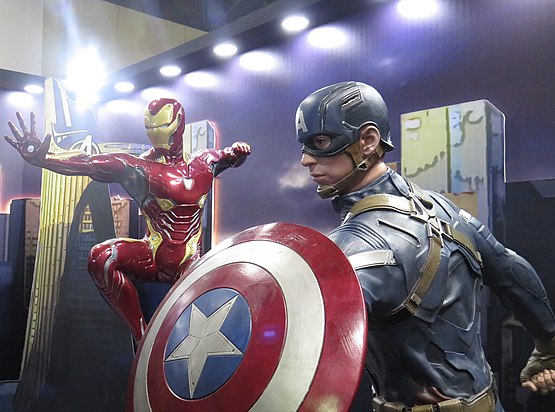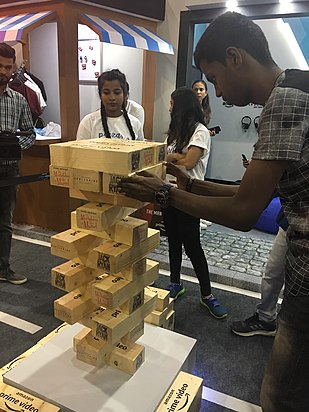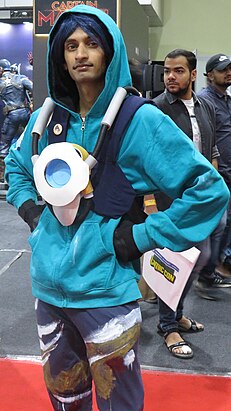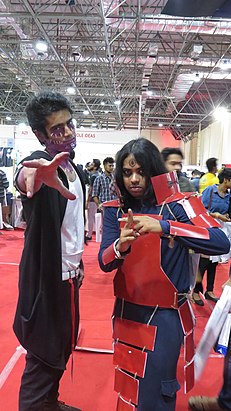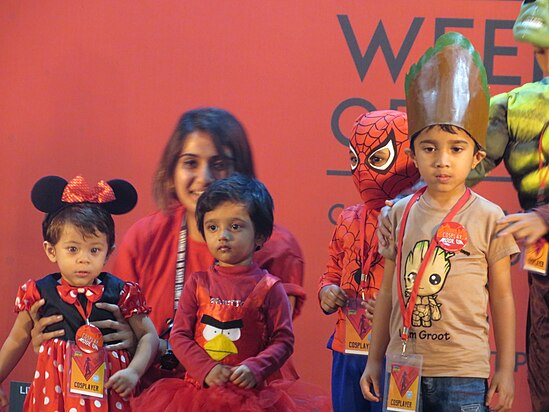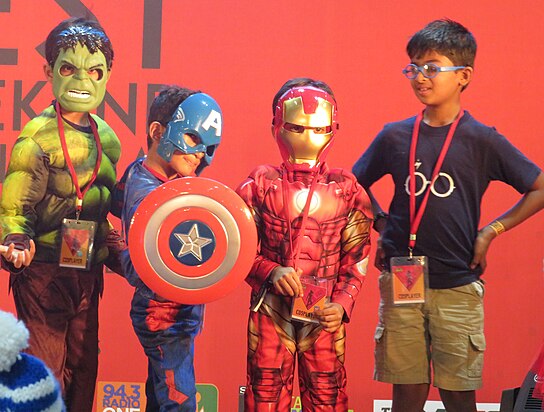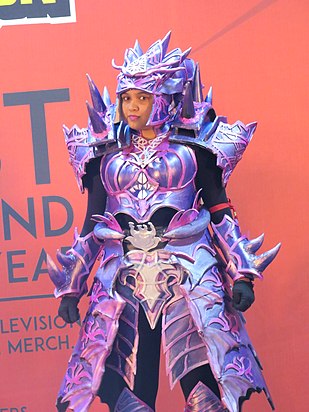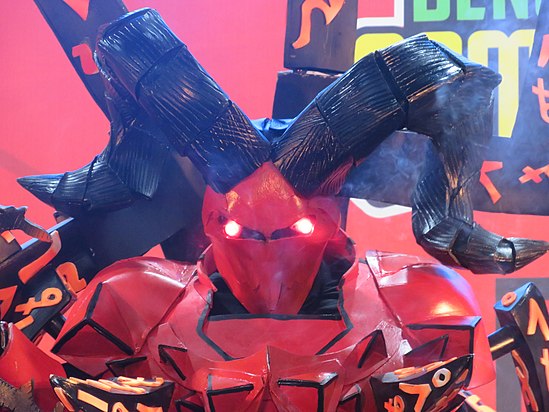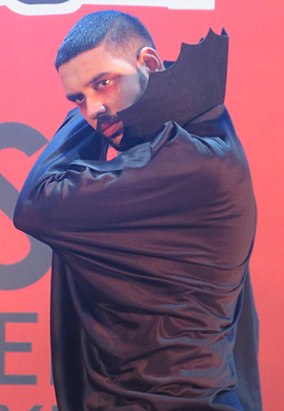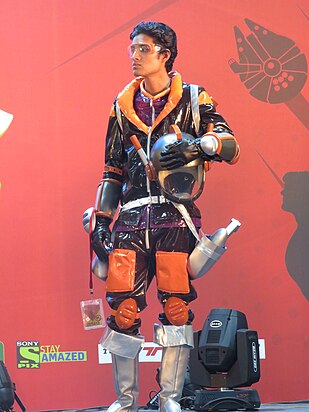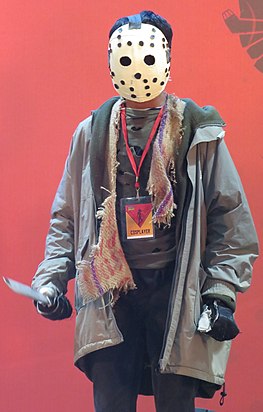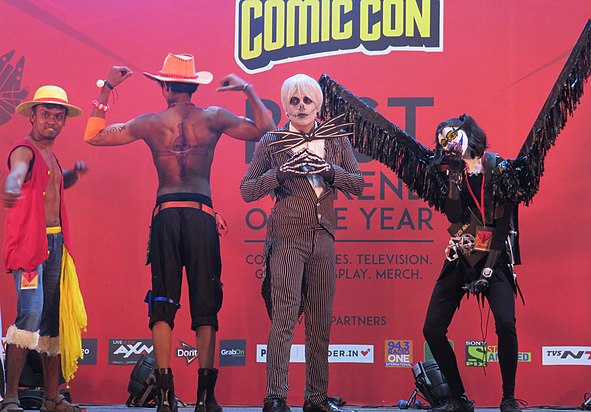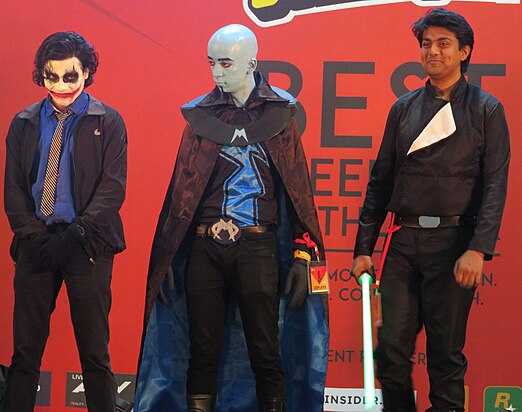Wikinews attends 2018 Bangalore ComicCon
Thursday, November 29, 2018

Image: Agastya.
On November 17 and November 18, Wikinews attended the 2018 Bangalore Comicbook Convention, in Karnataka, India. Beginning on Saturday morning, the ComicCon continued till Sunday. Organised by ComicCon India, who organised Comic Con in Hyderabad in October, this event was held at Karnataka Trade Promotion Organisation (KTPO)'s convention hall. Wikinews spoke to convention's international guests Ryan O'Sullivan, Dan Watters, and Vanesa Del Ray.
UK-based freelancer comicbook writer Ryan O'Sullivan, who has worked for Image Comics and Vault Comics, and wrote video game comics including Eisenhorn, Warhammer 40,000, and Dark Souls, was one of the guests attending ComicCon. Along with him, London-based freelance comic book writer Dan Watters was also one of the attendants. Watters has worked with Image Comics on Limbo, as well as Lucifer for Vertigo Comics. Watters has also written comics for Assassin's Creed, Wolfenstein and Deep Roots. Cuban comic book artist Vanesa Del Rey was also one of the guest attendants, who has illustrated Scarlet Witch, Daredevil Annual, and Spider-Women Alpha for Marvel Comics; and Redlands for Image Comics.
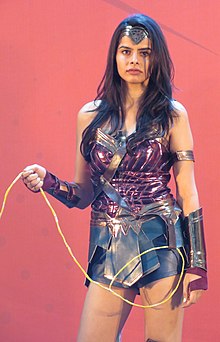
Image: Agastya.
The convention started at 11 AM. Crossing between the genres of science fiction, horror, anime, fantasy and comics, the event sprawled throughout all corners of the facility. Marvel Zone, Amazon Video zone, AXN Live RED Special Session, Warner Bros' Aquaman and Fantastic Beasts: Crimes of Grindelwald experience, and Sony Pix zone attracted large number of audience.
On day two, Sumit Kumar, creator of Chin Chin, inspired by Chacha Chaudhary and Tintin, had a panel in the afternoon.
At 1:30 PM, there was a video presentation by Yali Dream Creations. The video was about The Village. Yali Dream Creations' Shamik Das Gupta said the story of their comic The Village is "supernatural, social, horror". Later, there was another presentation about their other comic, Rakshak ((hi))Hindi language: Protector — A Hero Among Us, about a masked vigilante in India. The first part of the four-part comic was released in 2016's Delhi ComicCon, Gupta said. Gupta also added "Delhi gang rape story pushed me". The session ended around 1:45 PM.

Image: Agastya.
After Yali Dream Creations, there was a comic launch by Rahil Mohin. Mohin had previously launched Sufi Comics in 2008, The Wise Fool of Baghdad and two comics about Persian poet Rumi and now Blame it on Rahil. While he was on the panel, he was sketching cartoon, while the host was asking questions that Mohin had prepared, focused on the 90s cartoon themes. The questions were "[What was the] breed of Courage the Cowardly Dog?", "Catchphrase of Flintstone", and "Arch nemesis of Dexter". His session finished by 2 PM.
At 2 PM, there was a session with AXN, and questions about AXN shows. Musician Shrey also played scores of various AXN shows on guitar, which audience had to guess. At 2:30 PM, there was a session with Cuban comic artist Vanesa Del Rey. She said it was her first convention in India, and said, "It is like any major convention in the US". This year, Vanesa Del Rey was nominated for an Eisner Award. During the discussion, she said she wanted to do sci-fi epic,romance, mystery and thriller comics in future. Regarding romance genre in comics, she said it is "something worth exploring". And regarding her career choice, she said her grandmother was an artist and her "family was very supportive".

Image: Agastya.
Later, there was a session with Sony PIX, with Minions appearing on the stage.
The event finished around 8 PM.
Interviews
Interview with English comic book writer Ryan O'Sullivan

Image: Agastya.

Thank you for agreeing to the interview. So Mr O'Sullian, could you tell us something about yourself?
![]() ((Ryan O'Sullivan
((Ryan O'Sullivan![]() )) My name is Ryan O' Sullivan. I am a comic book writer from the UK. I have written books such as Void Trip for Image Comics, Fearscape for Vault Comics, as well as a lot of video game-based comics, like Dark Souls, The Evil Within, Warhammer 40,000, Eisenhorn. So that's me in a nutshell.
)) My name is Ryan O' Sullivan. I am a comic book writer from the UK. I have written books such as Void Trip for Image Comics, Fearscape for Vault Comics, as well as a lot of video game-based comics, like Dark Souls, The Evil Within, Warhammer 40,000, Eisenhorn. So that's me in a nutshell.
![]() ((A
((A![]() )) How old are you, and when did you start writing comics?
)) How old are you, and when did you start writing comics?
![]() ((ROS
((ROS![]() )) I am in my 30s, and I started writing comics, ah, well I don't know, I have been writing all my life, but I have done it professionally for, I'll say, two years now. Maybe three.
)) I am in my 30s, and I started writing comics, ah, well I don't know, I have been writing all my life, but I have done it professionally for, I'll say, two years now. Maybe three.
![]() ((A
((A![]() )) How was your first job like?
)) How was your first job like?
![]() ((ROS
((ROS![]() )) My first — my first job? Oh boy! [Laughs] That was um, it was interesting. So the first comic that I did was called Turncoat, and that was purely online. So that everyday, we'd put another page of the comic out. And that's how I got known because people go online, they'd read the comic, and then after a certain amount of time, we'd collect it all together in a big comic, and they say that the first time you do a comic, you should make it small, you do a few pages just to learn it. But for mine, I did it for a hundred and sixty four pages And I'm thrown in at the deep end, and somehow I managed to swim. But it was, it was pretty stressful, but was very fun[?].
)) My first — my first job? Oh boy! [Laughs] That was um, it was interesting. So the first comic that I did was called Turncoat, and that was purely online. So that everyday, we'd put another page of the comic out. And that's how I got known because people go online, they'd read the comic, and then after a certain amount of time, we'd collect it all together in a big comic, and they say that the first time you do a comic, you should make it small, you do a few pages just to learn it. But for mine, I did it for a hundred and sixty four pages And I'm thrown in at the deep end, and somehow I managed to swim. But it was, it was pretty stressful, but was very fun[?].
![]() ((A
((A![]() )) Well, so how many companies have you worked with?
)) Well, so how many companies have you worked with?
![]() ((ROS
((ROS![]() )) Oh! Um... I would say around half a dozen, at a guess [...] Image Comics, I have worked with Vault Comics, I've worked with T-Pub: that's a small UK publisher. I've worked with Titan Comics. And what's interesting is with the video game comics, that means I've worked with a lot of other companies as well, like video game companies, so, Bethesda, SEGA, Relic. I feel I'm missing people out now, just 'cause it's quite a lot. But yeah, it's been a lot of people. But I would say, of them all, if I could talk to fourteen-year-old Ryan, and tell him what his future would be like, the thing that might excite him the most is the fact that I wrote a comic for Warhammer and Games Workshop, because that's what was my jam as a kid.
)) Oh! Um... I would say around half a dozen, at a guess [...] Image Comics, I have worked with Vault Comics, I've worked with T-Pub: that's a small UK publisher. I've worked with Titan Comics. And what's interesting is with the video game comics, that means I've worked with a lot of other companies as well, like video game companies, so, Bethesda, SEGA, Relic. I feel I'm missing people out now, just 'cause it's quite a lot. But yeah, it's been a lot of people. But I would say, of them all, if I could talk to fourteen-year-old Ryan, and tell him what his future would be like, the thing that might excite him the most is the fact that I wrote a comic for Warhammer and Games Workshop, because that's what was my jam as a kid.
![]() ((A
((A![]() )) So, would you classify yourself as a freelancer?
)) So, would you classify yourself as a freelancer?
![]() ((ROS
((ROS![]() )) I would say so, yeah.
)) I would say so, yeah.
![]() ((A
((A![]() )) And do you plan just working for a company, or would you like to carry on freelancing?
)) And do you plan just working for a company, or would you like to carry on freelancing?
![]() ((ROS
((ROS![]() )) I enjoy freelancing, because it gives me the freedom to work whenever I want, and do whatever projects I like. And no one person is in-charge of me, and that's really fun.
)) I enjoy freelancing, because it gives me the freedom to work whenever I want, and do whatever projects I like. And no one person is in-charge of me, and that's really fun.
![]() ((A
((A![]() )) What does a normal day at work look for you?
)) What does a normal day at work look for you?
![]() ((ROS
((ROS![]() )) I wake up. I have coffee. I write all day, until I can't write anymore. Then I have more coffee. Then I read until I can't read anymore. And then I fall asleep. Seven days in the week. That's my life. Sometimes I escape to ComicCons like this.
)) I wake up. I have coffee. I write all day, until I can't write anymore. Then I have more coffee. Then I read until I can't read anymore. And then I fall asleep. Seven days in the week. That's my life. Sometimes I escape to ComicCons like this.
![]() ((A
((A![]() )) What are the changes in the comic book industry that you have noticed?
)) What are the changes in the comic book industry that you have noticed?
![]() ((ROS
((ROS![]() )) I've noticed that a lot of diverse voices are becoming more prominent recently. And I think that's, it's because I think in society in general, diverse voices from different cultures, different backgrounds, different sort of sects and preferences and whatnot are becoming a lot more prominent in general. And with comics being on the edge, the fringe medium, that tends to accumulate whatever is coming, a lot quicker than say film or other mediums. So I think that new voices is one big thing, one big part of comics. And also, diversification of how it is published. So now it's not just comics in comics stores, you've also got bookstores, you've got online, you've got digital, you've got web-comics like I told you, that I did. So there's a lot more avenues for people to get involved, make their own comics, [...]. I mean, ComicCon India is an exact example of the growing comic market.
)) I've noticed that a lot of diverse voices are becoming more prominent recently. And I think that's, it's because I think in society in general, diverse voices from different cultures, different backgrounds, different sort of sects and preferences and whatnot are becoming a lot more prominent in general. And with comics being on the edge, the fringe medium, that tends to accumulate whatever is coming, a lot quicker than say film or other mediums. So I think that new voices is one big thing, one big part of comics. And also, diversification of how it is published. So now it's not just comics in comics stores, you've also got bookstores, you've got online, you've got digital, you've got web-comics like I told you, that I did. So there's a lot more avenues for people to get involved, make their own comics, [...]. I mean, ComicCon India is an exact example of the growing comic market.
![]() ((A
((A![]() )) Who was your favourite super-hero?
)) Who was your favourite super-hero?
![]() ((ROS
((ROS![]() )) My favourite super-hero is actually a super-villain. Doctor Doom. Because he is just the biggest badass ever. He's inspired so many villains. He inspired Darth Vader. The guy is just the coolest character ever. So I have not had a chance to write him yet, but if I do, I have got a few stories up my sleeve.
)) My favourite super-hero is actually a super-villain. Doctor Doom. Because he is just the biggest badass ever. He's inspired so many villains. He inspired Darth Vader. The guy is just the coolest character ever. So I have not had a chance to write him yet, but if I do, I have got a few stories up my sleeve.
![]() ((A
((A![]() )) Do you have some head-cannons regarding that and you will write fan-fiction about it?
)) Do you have some head-cannons regarding that and you will write fan-fiction about it?
![]() ((ROS
((ROS![]() )) I don't write fan-fiction, but I do have a few ideas in my head for how [Doctor] Doom could play.
)) I don't write fan-fiction, but I do have a few ideas in my head for how [Doctor] Doom could play.
![]() ((A
((A![]() )) Could you brief me about the process from, how an idea comes, and goes to the publication, and it is in the hands of any reader?
)) Could you brief me about the process from, how an idea comes, and goes to the publication, and it is in the hands of any reader?
![]() ((ROS
((ROS![]() )) You mean like,how does it go from being an idea in my head to a comic in someone's hand? Okay; well, typically, I will come up with an idea and you don't know where you get your ideas from, they appear out of the blue, just jump into your brain, and if they stay around for a while, you can't get rid of them just by ignoring them, that means you have to write them. So what happens usually is I will write on a one-page sheet, of what the comics is about, what my idea for the story would be. And then I find an artist who likes that idea, and I team with them, and I write the script, and the artists will take the scripts off me and draw it, and I will say, "Okay, first page, I want a picture of this, picture of this, this dialogue, and this dialogue." And then, once we have created the first issue, we'll send that to a publisher, they will proof[read] it, check the spelling mistakes, there's not many of them. And what they do it to print it and send it out to stores. So that would be the "short-and-sweet" way it works.
)) You mean like,how does it go from being an idea in my head to a comic in someone's hand? Okay; well, typically, I will come up with an idea and you don't know where you get your ideas from, they appear out of the blue, just jump into your brain, and if they stay around for a while, you can't get rid of them just by ignoring them, that means you have to write them. So what happens usually is I will write on a one-page sheet, of what the comics is about, what my idea for the story would be. And then I find an artist who likes that idea, and I team with them, and I write the script, and the artists will take the scripts off me and draw it, and I will say, "Okay, first page, I want a picture of this, picture of this, this dialogue, and this dialogue." And then, once we have created the first issue, we'll send that to a publisher, they will proof[read] it, check the spelling mistakes, there's not many of them. And what they do it to print it and send it out to stores. So that would be the "short-and-sweet" way it works.
![]() ((A
((A![]() )) Well so, how to you maintain continuity and fluidity of the story across the pages?
)) Well so, how to you maintain continuity and fluidity of the story across the pages?
![]() ((ROS
((ROS![]() )) By being very diligent before I write it. So if I've, I am a big believer that you should outline everything. So before I write the script I've got it all planned out, I know which character's gonna go where; so that I don't have to make it up and hope I can remember what's all going to happen. If I have got it all laid out, "okay, Issue #1 this happens. Issue #2 this happens." I have got a flow chart of all the characters and where they are. That, it might be a bit overkill but for me, it keeps it all. Of course, when I sit down to write, then I just ignore it and do whatever I want. But yeah, outlining is the way to make sure the story flows the way I want it to.
)) By being very diligent before I write it. So if I've, I am a big believer that you should outline everything. So before I write the script I've got it all planned out, I know which character's gonna go where; so that I don't have to make it up and hope I can remember what's all going to happen. If I have got it all laid out, "okay, Issue #1 this happens. Issue #2 this happens." I have got a flow chart of all the characters and where they are. That, it might be a bit overkill but for me, it keeps it all. Of course, when I sit down to write, then I just ignore it and do whatever I want. But yeah, outlining is the way to make sure the story flows the way I want it to.
![]() ((A
((A![]() )) Do you enjoy movie adaptations of comics?
)) Do you enjoy movie adaptations of comics?
![]() ((ROS
((ROS![]() )) I do, yeah. For different reasons. I like, I really enjoy The Walking Dead. I know it's not a movie, but, actually, no, it is! There a movie coming out. I really enjoy that because, what I find fascinating is it is very different from the comic, but it appeals to the same idea, the same feel. Because in comic, certain characters set stories, and in the show, they put the same stories, but they mix all the characters up, like who is doing what, so you still don't know who's going to die, who is going to be the hero, who is going to be the villain, and I like that unpredictability. I don't like the idea of taking a comic and making it exactly the same in the film. I think that you should translate it to a new medium and use that new medium to its most potential. So, yeah, I really enjoy them a lot. Ah, and yeah, obviously the Marvel films too.
)) I do, yeah. For different reasons. I like, I really enjoy The Walking Dead. I know it's not a movie, but, actually, no, it is! There a movie coming out. I really enjoy that because, what I find fascinating is it is very different from the comic, but it appeals to the same idea, the same feel. Because in comic, certain characters set stories, and in the show, they put the same stories, but they mix all the characters up, like who is doing what, so you still don't know who's going to die, who is going to be the hero, who is going to be the villain, and I like that unpredictability. I don't like the idea of taking a comic and making it exactly the same in the film. I think that you should translate it to a new medium and use that new medium to its most potential. So, yeah, I really enjoy them a lot. Ah, and yeah, obviously the Marvel films too.
![]() ((A
((A![]() )) Who were your mentors?
)) Who were your mentors?
![]() ((ROS
((ROS![]() )) My mentors? Me. I am my mentor. Because a lot of comics is self-learned. But if you would say "Who inspires me?", "Which writers?" I would say, Vladimir Nabokov, James Joyce and Herman Melville. [...] They're probably the writers who, essentially any writer who is angry, and argues a lot in their books, they are the ones I tend to like. I think, okay, I think Eminem is probably my real, my real influence.
)) My mentors? Me. I am my mentor. Because a lot of comics is self-learned. But if you would say "Who inspires me?", "Which writers?" I would say, Vladimir Nabokov, James Joyce and Herman Melville. [...] They're probably the writers who, essentially any writer who is angry, and argues a lot in their books, they are the ones I tend to like. I think, okay, I think Eminem is probably my real, my real influence.
![]() ((A
((A![]() )) If you could travel back in time, what advice would you give to your younger self?
)) If you could travel back in time, what advice would you give to your younger self?
![]() ((ROS
((ROS![]() )) [Pauses for a while] "Stop partying so much, go home, and write. Because it takes ages, and you are going to regret [all] this time spent partying. Because ultimately what you want to do with your life, Ryan, isn't party, it's to write. So get on with it." That's what I'ld tell twenty-year-old Ryan. But I'd tell fourteen-year-old Ryan: "Ignore mum and dad. Keep playing video games; it's gonna help in the long run."
)) [Pauses for a while] "Stop partying so much, go home, and write. Because it takes ages, and you are going to regret [all] this time spent partying. Because ultimately what you want to do with your life, Ryan, isn't party, it's to write. So get on with it." That's what I'ld tell twenty-year-old Ryan. But I'd tell fourteen-year-old Ryan: "Ignore mum and dad. Keep playing video games; it's gonna help in the long run."
![]() ((A
((A![]() )) Do you mind if I take a photo of yours?
)) Do you mind if I take a photo of yours?
![]() ((ROS
((ROS![]() )) Yeah, by all means!
)) Yeah, by all means!
Interview with English comic book writer Dan Watters

Image: Agastya.

Thank you for agreeing to the interview.
![]() ((Agastya
((Agastya![]() )) So, would you mind telling us about yourself?
)) So, would you mind telling us about yourself?
![]() ((Dan Watters
((Dan Watters![]() )) Um, Okay. I'm Dan Watters. I am currently writing Lucifer for Vertigo Comics. And Deep Roots for Vault Comics. I've done series for Assassin's Creed, for Wolfenstein. Limbo was my first book, at Image Comics.
)) Um, Okay. I'm Dan Watters. I am currently writing Lucifer for Vertigo Comics. And Deep Roots for Vault Comics. I've done series for Assassin's Creed, for Wolfenstein. Limbo was my first book, at Image Comics.
![]() ((A
((A![]() )) How old are you and when did you start writing comics?
)) How old are you and when did you start writing comics?
![]() ((DW
((DW![]() )) I am 27. And my first book came out in 2015. So for about three years, I have been doing it professionally.
)) I am 27. And my first book came out in 2015. So for about three years, I have been doing it professionally.
![]() ((A
((A![]() )) What drew you into comics, and who was the major influence for you to start writing comics?
)) What drew you into comics, and who was the major influence for you to start writing comics?
![]() ((DW
((DW![]() )) Oh man! I originally thought I was gonna get into film-making, but that's such a slow and arduous process, and sort of relinquish control to so many people because of such a big team and everything, that I sort of fell into comics as something where you, where the writer has a little bit more control, like, directly. Major influence-wise, I was a huge fan of old-school Vertigo stuff: say, Sandman, Lucifer, Swamp Thing, Doom Patrol: those were the books that really made me want to write.
)) Oh man! I originally thought I was gonna get into film-making, but that's such a slow and arduous process, and sort of relinquish control to so many people because of such a big team and everything, that I sort of fell into comics as something where you, where the writer has a little bit more control, like, directly. Major influence-wise, I was a huge fan of old-school Vertigo stuff: say, Sandman, Lucifer, Swamp Thing, Doom Patrol: those were the books that really made me want to write.
![]() ((A
((A![]() )) What was your first job like?
)) What was your first job like?
![]() ((DW
((DW![]() )) My first comics job? [...] Ah, well, Caspar Wijngaard the artist and I pitched Limbo to Image Comics, in-person at a festival, a ComicCon, in the UK called Thought Bubble, and, we got the go ahead, to go away and make that book, but we were brand-new, we had no idea of what we were doing. And we entirely had to essentially work, or feel our way through. So we weren't doing a book that had an editor, or had other people in charge. It was just the two of us making this book, which was just amazing and terrifying, but such a sort of trial by fire as far as these things go so there's no one to tell us how to do things things, but it was great, I mean, really happy how the book came out.
)) My first comics job? [...] Ah, well, Caspar Wijngaard the artist and I pitched Limbo to Image Comics, in-person at a festival, a ComicCon, in the UK called Thought Bubble, and, we got the go ahead, to go away and make that book, but we were brand-new, we had no idea of what we were doing. And we entirely had to essentially work, or feel our way through. So we weren't doing a book that had an editor, or had other people in charge. It was just the two of us making this book, which was just amazing and terrifying, but such a sort of trial by fire as far as these things go so there's no one to tell us how to do things things, but it was great, I mean, really happy how the book came out.
![]() ((A
((A![]() )) How has the times changed since then?
)) How has the times changed since then?
![]() ((DW
((DW![]() )) Well, now I am working with a, because I have done a lot of work stuff on licensed works, doing stuff which is other people's properties: so be it big franchises, like Assassin's Creed and Wolfenstein where it's very well established things that you have to sort of, you know, there's certain fan expectations in that and things that you need to, things you need to have. To something like Lucifer which I am doing now, which is a spin-off of Sandman, so it's Neil Gaiman worlds, that I'm writing. And so it's a big difference between writing from something that's entirely your own and you can do anything with it; and writing something that's someone else's that has the weight of history, you know, has a weight of series history behind it. But, I enjoy all of it.
)) Well, now I am working with a, because I have done a lot of work stuff on licensed works, doing stuff which is other people's properties: so be it big franchises, like Assassin's Creed and Wolfenstein where it's very well established things that you have to sort of, you know, there's certain fan expectations in that and things that you need to, things you need to have. To something like Lucifer which I am doing now, which is a spin-off of Sandman, so it's Neil Gaiman worlds, that I'm writing. And so it's a big difference between writing from something that's entirely your own and you can do anything with it; and writing something that's someone else's that has the weight of history, you know, has a weight of series history behind it. But, I enjoy all of it.
![]() ((A
((A![]() )) So, you are a freelancer, right?
)) So, you are a freelancer, right?
![]() ((DW
((DW![]() )) Yes.
)) Yes.
![]() ((A
((A![]() )) Do you plan on fixing to one job or do you wish to continue freelancing?
)) Do you plan on fixing to one job or do you wish to continue freelancing?
![]() ((DW
((DW![]() )) Yeah, I think, I think most comics creators tend to work freelancing, and it's a really nice was of doing it. It's a really nice to have a balance between making your own stuff from scratch, and working on other things where you don't have to worry about the sort of world-building and creating everything, explaining everything. To sort of jump in to someone else's sandpit is really freeing sometimes as well. So I wanna keep doing both, as much as possible. And I want to work in other mediums: I want to write plays, I want to write novels. I want to write everything.
)) Yeah, I think, I think most comics creators tend to work freelancing, and it's a really nice was of doing it. It's a really nice to have a balance between making your own stuff from scratch, and working on other things where you don't have to worry about the sort of world-building and creating everything, explaining everything. To sort of jump in to someone else's sandpit is really freeing sometimes as well. So I wanna keep doing both, as much as possible. And I want to work in other mediums: I want to write plays, I want to write novels. I want to write everything.
![]() ((A
((A![]() )) How does a normal day of work look like?
)) How does a normal day of work look like?
![]() ((DW
((DW![]() )) [Chuckles] I kind of try and like trick myself into thinking that there's no such thing as a "normal day", but there really is. Because I am a freelancer, I could just sit home the whole day, but the idea of that is horrific. So I try [to] get up and get out as early as I can in the morning, which doesn't necessarily mean super early. [Laughs] But I get up and go out. I spend way too much money in coffee shops, because I go work in a coffee shop: just sit there for like hours with my laptop, like a proper writer's cliché.
)) [Chuckles] I kind of try and like trick myself into thinking that there's no such thing as a "normal day", but there really is. Because I am a freelancer, I could just sit home the whole day, but the idea of that is horrific. So I try [to] get up and get out as early as I can in the morning, which doesn't necessarily mean super early. [Laughs] But I get up and go out. I spend way too much money in coffee shops, because I go work in a coffee shop: just sit there for like hours with my laptop, like a proper writer's cliché.
![]() ((A
((A![]() )) Other than writing what else do you prefer to do?
)) Other than writing what else do you prefer to do?
![]() ((DW
((DW![]() )) I mean, writing is kind of a black hole, in that everything sort of ends up getting pulled into it. So, I mean I love to read, I always have. If I am left alone for an hour, what I want to do is read. The other thing that I've got quite into this year is rock climbing but I'm not very good at it. But it's a really nice thing that turns off, it's the only thing I know that turns off that side of my brain, that turns of the right side, there's so much problem-solving that you can't think of other stuff while you are doing it. So I really enjoy that.
)) I mean, writing is kind of a black hole, in that everything sort of ends up getting pulled into it. So, I mean I love to read, I always have. If I am left alone for an hour, what I want to do is read. The other thing that I've got quite into this year is rock climbing but I'm not very good at it. But it's a really nice thing that turns off, it's the only thing I know that turns off that side of my brain, that turns of the right side, there's so much problem-solving that you can't think of other stuff while you are doing it. So I really enjoy that.
![]() ((A
((A![]() )) How has the significance of comics changed over the years?
)) How has the significance of comics changed over the years?
![]() ((DW
((DW![]() )) Oh, now, how long have you got? It's a difficult question, because, the industry, I have heard people talking: you get a lot of angry people on Twitter talking about the dying industry and everything, but it's just, I think, working out, what it needs to be; what the medium needs to be. The superhero films and stuff is all fantastic and it's great, but I don't think it massively impacts the actual comics fan bases in any big way. And I think in the last few years we have seen a real build-up and influx of shorter, create-your-own books, which is something I really like, because it means that's just like ideas after idea after idea after idea sort of getting out there. So I am excited to see where comics goes in the next few years.
)) Oh, now, how long have you got? It's a difficult question, because, the industry, I have heard people talking: you get a lot of angry people on Twitter talking about the dying industry and everything, but it's just, I think, working out, what it needs to be; what the medium needs to be. The superhero films and stuff is all fantastic and it's great, but I don't think it massively impacts the actual comics fan bases in any big way. And I think in the last few years we have seen a real build-up and influx of shorter, create-your-own books, which is something I really like, because it means that's just like ideas after idea after idea after idea sort of getting out there. So I am excited to see where comics goes in the next few years.
![]() ((A
((A![]() )) How do you manage the continuity of your work?
)) How do you manage the continuity of your work?
![]() ((DW
((DW![]() )) I tend to plan stuff out in story arcs. So I'll plan, I'll plot something that's maybe four issues long to six issues long and have that quite nailed down before I start writing the first issue. So I try to think of a volume, [...] as the finished book. So every book should have kind of its own tone, and its own story-line, even if you are writing something much longer, it's going to be split up into volumes, and I would like each volume to have its own feel.
)) I tend to plan stuff out in story arcs. So I'll plan, I'll plot something that's maybe four issues long to six issues long and have that quite nailed down before I start writing the first issue. So I try to think of a volume, [...] as the finished book. So every book should have kind of its own tone, and its own story-line, even if you are writing something much longer, it's going to be split up into volumes, and I would like each volume to have its own feel.
![]() ((A
((A![]() )) As a child whom did you aspire to be?
)) As a child whom did you aspire to be?
![]() ((DW
((DW![]() )) I mean I wanted to be a writer, kind of always. There was a times where I took it more seriously than others, there was times I just sort of didn't write very much, like, "Oh yeah, that's fine, I will get back to it".
)) I mean I wanted to be a writer, kind of always. There was a times where I took it more seriously than others, there was times I just sort of didn't write very much, like, "Oh yeah, that's fine, I will get back to it".
![]() ((A
((A![]() )) What are the projects you are currently working on?
)) What are the projects you are currently working on?
![]() ((DW
((DW![]() )) Projects I am currently working on: Lucifer. Issue two comes out on this coming Wednesday, and we are way out ahead with the scripts and with the art, so that's taking a lot of my time. I'm also just finishing up Deep Roots of Vault Comics which is sort an "eco-thriller" create-your-own-thing, it's a great book. And I have been working on, I think three other things I can't talk about yet.
)) Projects I am currently working on: Lucifer. Issue two comes out on this coming Wednesday, and we are way out ahead with the scripts and with the art, so that's taking a lot of my time. I'm also just finishing up Deep Roots of Vault Comics which is sort an "eco-thriller" create-your-own-thing, it's a great book. And I have been working on, I think three other things I can't talk about yet.
![]() ((A
((A![]() )) Have you seen the movie adaptation of Assassin's Creed?
)) Have you seen the movie adaptation of Assassin's Creed?
![]() ((DW
((DW![]() )) I have, yeah!
)) I have, yeah!
![]() ((A
((A![]() )) What do you think about that movie?
)) What do you think about that movie?
![]() ((DW
((DW![]() )) It's great. I mean, the exciting thing about Assassin's Creed as a franchise is that everything is a single continuity and I don't think any other franchise has really done that. If you look at, like the Marvel films and the Marvel comics: they're separate things and they don't affect each other. But with Assassin's Creed, the film, the games, and the comics are all one direct continuity. So watching stuff from that film, which I know affects stuff in the book I write and vice-versa was really really cool.
)) It's great. I mean, the exciting thing about Assassin's Creed as a franchise is that everything is a single continuity and I don't think any other franchise has really done that. If you look at, like the Marvel films and the Marvel comics: they're separate things and they don't affect each other. But with Assassin's Creed, the film, the games, and the comics are all one direct continuity. So watching stuff from that film, which I know affects stuff in the book I write and vice-versa was really really cool.
![]() ((A
((A![]() )) If you had a message for your younger self, what it would be?
)) If you had a message for your younger self, what it would be?
![]() ((DW
((DW![]() )) My younger self? Probably just tell him to just actually start writing stuff. Start writing stuff. Carry a notebook! When you carry a notebook, that's when you start, I think that's when I became an actual writer.
)) My younger self? Probably just tell him to just actually start writing stuff. Start writing stuff. Carry a notebook! When you carry a notebook, that's when you start, I think that's when I became an actual writer.
![]() ((A
((A![]() )) I guess that was all. Do you mind if I take a photo of yours?
)) I guess that was all. Do you mind if I take a photo of yours?
![]() ((DW
((DW![]() )) Yeah, sure! No problem.
)) Yeah, sure! No problem.
Interview with Cuban comic book artist Vanesa Del Rey

Image: Agastya.

Thank you for agreeing to the interview.
![]() ((Agastya
((Agastya![]() )) So ma'am would you please tell us about yourself?
)) So ma'am would you please tell us about yourself?
![]() ((Vanesa Del Rey
((Vanesa Del Rey![]() )) My name is Vanesa and I live in Miami, Florida [United States]. And I am an illustrator for comics. Um, my current work is called Redlands and it's a horror book.
)) My name is Vanesa and I live in Miami, Florida [United States]. And I am an illustrator for comics. Um, my current work is called Redlands and it's a horror book.
![]() ((A
((A![]() )) Since when did you start [...] drawing concept arts and got into comics?
)) Since when did you start [...] drawing concept arts and got into comics?
![]() ((VDR
((VDR![]() )) Concept art: I started working on that right after I went to school. I got a job at an animation studio, and then there I did concept art like cartoon design, paintings, story boarding; and then while I was working there, a publisher approached me and they wanted me to work on a series for them. And I said, "Yeah", and that's how I got into comics. Like I, it was: I just got an email one day. [Laughs]
)) Concept art: I started working on that right after I went to school. I got a job at an animation studio, and then there I did concept art like cartoon design, paintings, story boarding; and then while I was working there, a publisher approached me and they wanted me to work on a series for them. And I said, "Yeah", and that's how I got into comics. Like I, it was: I just got an email one day. [Laughs]
![]() ((A
((A![]() )) So, what was your first job like?
)) So, what was your first job like?
![]() ((VDR
((VDR![]() )) In comics?
)) In comics?
![]() ((A
((A![]() )) Yes.
)) Yes.
![]() ((VDR
((VDR![]() )) It was... it was a big learning experience. I had never done anything long term, you know? Like I was just used to just doing a couple of pages. But this was, like, a long series. So I learned a lot about my process and how to be more efficient, you know. With time, especially, because I was taking too long doing the work, because I didn't have a process set. So it was a big learning experience.
)) It was... it was a big learning experience. I had never done anything long term, you know? Like I was just used to just doing a couple of pages. But this was, like, a long series. So I learned a lot about my process and how to be more efficient, you know. With time, especially, because I was taking too long doing the work, because I didn't have a process set. So it was a big learning experience.
![]() ((A
((A![]() )) How much time does it [drawing concept art] take? What are the processes like?
)) How much time does it [drawing concept art] take? What are the processes like?
![]() ((VDR
((VDR![]() )) It's very time consuming. Because you go through so many options, so many, like trial and errors. And you don't know what you are look for. You sort of like have to search and, like, look at a lot of things and do a lot of, you know, a lot of work, to find the final thing that matches with what you are trying to express, you know. So, it takes a long time. [Laughs]
)) It's very time consuming. Because you go through so many options, so many, like trial and errors. And you don't know what you are look for. You sort of like have to search and, like, look at a lot of things and do a lot of, you know, a lot of work, to find the final thing that matches with what you are trying to express, you know. So, it takes a long time. [Laughs]
![]() ((A
((A![]() )) What are the projects that you have worked on?
)) What are the projects that you have worked on?
![]() ((VDR
((VDR![]() )) So far?
)) So far?
![]() ((A
((A![]() )) Yes.
)) Yes.
![]() ((VDR
((VDR![]() )) Okay so I started with Boom! Studios, and with them, I did this series called Hit. Then, with them I did a series called The Empty Man. And after that, I did the Scarlet Witch, I think. Then after that I did Spider-Women, and I did a little bit of Constantine Hellblazer. I did a couple of anthologies. I did Daredevil annual in 2016. And after that I have been working on Redlands.
)) Okay so I started with Boom! Studios, and with them, I did this series called Hit. Then, with them I did a series called The Empty Man. And after that, I did the Scarlet Witch, I think. Then after that I did Spider-Women, and I did a little bit of Constantine Hellblazer. I did a couple of anthologies. I did Daredevil annual in 2016. And after that I have been working on Redlands.
![]() ((A
((A![]() )) What work are you most proud of?
)) What work are you most proud of?
![]() ((VDR
((VDR![]() )) I would say: my project Redlands, right now it's my most, the one I am most proud of because it's all mine, it's all my work. It's not something that's already been created, you know? It is coming from me. And my collaborators.
)) I would say: my project Redlands, right now it's my most, the one I am most proud of because it's all mine, it's all my work. It's not something that's already been created, you know? It is coming from me. And my collaborators.
![]() ((A
((A![]() )) So, have you watched [Avengers] Infinity War?
)) So, have you watched [Avengers] Infinity War?
![]() ((VDR
((VDR![]() )) Yeah! [Laughs]
)) Yeah! [Laughs]
![]() ((A
((A![]() )) Do you think Thanos did nothing wrong?
)) Do you think Thanos did nothing wrong?
![]() ((VDR
((VDR![]() )) Umm. In-teres-ting question. Wow! Hmm. [Laughs] I feel, umm, I feel there is a little bit of wrong in both sides. [Laughs again]. I feel like there're, there's a little bit of, um... there should be more compassion from each side. [Laughs] Do you know what I mean?
)) Umm. In-teres-ting question. Wow! Hmm. [Laughs] I feel, umm, I feel there is a little bit of wrong in both sides. [Laughs again]. I feel like there're, there's a little bit of, um... there should be more compassion from each side. [Laughs] Do you know what I mean?
![]() ((A
((A![]() )) Yes.
)) Yes.
![]() ((A
((A![]() )) So, if you could resurrect one character, one superhero which died in the movie, because of Thanos, whom would you resurrect?
)) So, if you could resurrect one character, one superhero which died in the movie, because of Thanos, whom would you resurrect?
![]() ((VDR
((VDR![]() )) Wassat?
)) Wassat?
![]() ((A
((A![]() )) Whom would you resurrect? Whom would you bring back to life?
)) Whom would you resurrect? Whom would you bring back to life?
![]() ((VDR
((VDR![]() )) Gamora! [Laughs] Of course! Is she dead though?
)) Gamora! [Laughs] Of course! Is she dead though?
![]() ((A
((A![]() )) What would you have done if you were not into comics?
)) What would you have done if you were not into comics?
![]() ((VDR
((VDR![]() )) I can't see myself doing anything else. You mean, nothing related to drawing? [...] I would be a painter, if I didn't do comics I would be a painter. But that's kinda similar. [Laughs] I would probably be into some sort of sports, because I'm really active, physically, so. [Laughs]
)) I can't see myself doing anything else. You mean, nothing related to drawing? [...] I would be a painter, if I didn't do comics I would be a painter. But that's kinda similar. [Laughs] I would probably be into some sort of sports, because I'm really active, physically, so. [Laughs]
![]() ((A
((A![]() )) Well, are you looking forward to watching the Spider-Verse movie?
)) Well, are you looking forward to watching the Spider-Verse movie?
![]() ((VDR
((VDR![]() )) Yeah. Sure! Sure. Spider-Man is not my favourite, but...
)) Yeah. Sure! Sure. Spider-Man is not my favourite, but...
![]() ((A
((A![]() )) But Gwenpool, oh I am sorry, Spider-Girl is coming.
)) But Gwenpool, oh I am sorry, Spider-Girl is coming.
![]() ((VDR
((VDR![]() )) Yeah, yeah. She is cool. [Laughs] But I am not a big fan of the Spider-Verse, but I mean, it's cool. It's interesting to watch.
)) Yeah, yeah. She is cool. [Laughs] But I am not a big fan of the Spider-Verse, but I mean, it's cool. It's interesting to watch.
![]() ((A
((A![]() )) Plus the way they are animating [...] if you have seen the trailer [...] let's say, when he punches someone, there's "POW!" written in the bubbles.
)) Plus the way they are animating [...] if you have seen the trailer [...] let's say, when he punches someone, there's "POW!" written in the bubbles.
![]() ((VDR
((VDR![]() )) Aah! There is? I haven't seen the trailer so. That sounds cool. [Laughs]
)) Aah! There is? I haven't seen the trailer so. That sounds cool. [Laughs]
![]() ((A
((A![]() )) One last thing: if you had a message for your younger self, what it probably would be?
)) One last thing: if you had a message for your younger self, what it probably would be?
![]() ((VDR
((VDR![]() )) Hmm. To be more patient! [Laugh] Not be in a hurry. And watch your thoughts.
)) Hmm. To be more patient! [Laugh] Not be in a hurry. And watch your thoughts.
![]() ((A
((A![]() )) Thanks for the interview. Do you mind if I take a photo?
)) Thanks for the interview. Do you mind if I take a photo?
![]() ((VDR
((VDR![]() )) No-no! Not at all! Yeah.
)) No-no! Not at all! Yeah.
Photos from the ComicCon
-
Outside the KTPO centre.
Image: Agastya. -
Image: Agastya. -
Image: Agastya. -
Image: Agastya. -
At the Rockstar booth.
Image: Agastya. -
Velociraptor structure outside the ComicCon location.
Image: Agastya. -
Maruti Suzuki fan experience.
Image: Agastya. -
Attendee sketching on a drawing tablet.
Image: Agastya. -
Attendee sketching Marvel characters.
Image: Agastya. -
Statues of Iron Man and Captain America at the Marvel Zone.
Image: Agastya. -
Marvel's Thor at the Marvel Zone.
Image: Agastya. -
Marvel's Hulk and Thor at the Marvel Zone.
Image: Agastya. -
DC's Mera and Aquaman.
Image: Agastya. -
Marvel Zone.
Image: Agastya. -
Image: Agastya. -
Games at the Amazon Prime Video zone.
Image: Agastya. -
Stall of Abhijeet Kini.
Image: Agastya. -
Rockstar studio at Bangalore ComicCon.
Image: Agastya. -
Winner of the Cosplay competition.
Image: Agastya.
Cosplayers
-
Cosplayers cosplaying Spider-Man (left) and Iron Man (right).
Image: Agastya. -
Image: Agastya. -
Cosplayer caosplaying Marvel's Iron Man.
Image: Agastya. -
Image: Agastya. -
Image: Agastya. -
Cosplayer cosplaying One Piece character.
Image: Agastya. -
Image: Agastya. -
Cosplayer cosplaying Joker from DC.
Image: Agastya. -
Cosplayer cosplaying Deadpool from Marvel Comics.
Image: Agastya. -
Cosplayer cosplaying Iron Man (left) and Spider-Man (right).
Image: Agastya. -
Cosplayer cosplaying Kakashi Hatake from Naruto anime.
Image: Agastya. -
Image: Agastya. -
Cosplayer cosplaying Ash Ketchum from Pokémon anime.
Image: Agastya. -
Image: Agastya. -
Cosplayer cosplaying The Winter Soldier from Captain America: The Winter Soldier.
Image: Agastya. -
Cosplayer dressed up as Megamind.
Image: Agastya. -
V for Vendetta mask.
Image: Agastya. -
Participants dressed up as Minnie Mouse, and an Angry Bird.
Image: Agastya. -
Participants dressed up as (from left to right) Minnie Mouse, an Angry Bird, Spider-Man and Groot.
Image: Agastya. -
Cosplayers as Captain America (left) and Iron Man (right).
Image: Agastya. -
Cosplayers as Harley Quinn (left) and Joker (right).
Image: Agastya. -
Cosplayer as Gamora (left) and Rapunzel (right).
Image: Agastya. -
Cosplayer as Spider-Man, Groot,Hulk, Captain America and Iron Man (from left to right).
Image: Agastya. -
Cosplayers as Harley Quinn (left) and Joker (right).
Image: Agastya. -
Cosplayers as Hulk, Captain America, Iron Man and Harry Potter (from left to right).
Image: Agastya. -
Cosplayers as Spider-Man.
Image: Agastya. -
Cosplayers as Batgirl, Wonder Woman, Belle and Moana (from left to right).
Image: Agastya. -
Cosplayers as Belle.
Image: Agastya. -
Cosplayer as Flinstone.
Image: Agastya. -
Cosplayer as Super Girl.
Image: Agastya. -
Cosplayers as Wonder Woman (left) and Captain America (right).
Image: Agastya. -
Cosplayers as PUBG characters.
Image: Agastya. -
Image: Agastya. -
Image: Agastya. -
Image: Agastya. -
Cosplayer dressed as Venom from Sony's titular movie.
Image: Agastya. -
Cosplayer as Rick Sanchez from Rick and Morty.
Image: Agastya. -
Cosplayer as Katniss Everdeen from The Hunger Games.
Image: Agastya. -
Cosplayer as Logan/Wolverine from Marvel's X-Men.
Image: Agastya. -
Cosplayer as Spider-Man from Avengers: Infinity War.
Image: Agastya. -
Cosplayer as Thor from Avengers: Infinity War.
Image: Agastya. -
Cosplayers as Pietro and Wanda Maximoff from Avengers: Age of Ultron.
Image: Agastya. -
Cosplayer cosplaying Black Widow.
Image: Agastya. -
Cosplayers as Pietro and Wanda Maximoff, Black Widow and Thor.
Image: Agastya. -
Image: Agastya. -
Image: Agastya. -
Cosplayers dressed up as Deadpool.
Image: Agastya. -
Cosplayer as Deadpool wearing a Batman mask, making the Deadpool 2 reference.
Image: Agastya. -
Image: Agastya. -
Image: Agastya. -
Cosplayer as Wonder Woman.
Image: Agastya. -
Image: Agastya. -
Cosplayers as Joker (left) and Wonder Woman (right).
Image: Agastya. -
Image: Agastya. -
Image: Agastya. -
Cosplayer as Gaara from Naruto.
Image: Agastya. -
Cosplayer as Ryuk, the shinigami from the Death Note.
Image: Agastya. -
Cosplayer as Count Dracula.
Image: Agastya. -
Cosplayer as Ryuk, the shinigami from the Death Note.
Image: Agastya. -
Cosplayer as Bumblebee from Transformers.
Image: Agastya. -
Image: Agastya. -
Image: Agastya. -
Image: Agastya. -
Image: Agastya. -
Cosplayer as Princess Diana.
Image: Agastya. -
Cosplayers as Diana Prince, Stormtrooper and the Grim Reaper (left to right)
Image: Agastya. -
Casey Jones (left) and April O'Neil (right) from Teenage Mutant Ninja Turtles.
Image: Agastya. -
Image: Agastya. -
Image: Agastya. -
Cosplayer as It from Stephen King's titular novel.
Image: Agastya. -
Image: Agastya. -
Cosplayer as Iron Man.
Image: Agastya. -
Cosplayer dressed up as Spider-Man with Captain America's shield.
Image: Agastya. -
Image: Agastya. -
Image: Agastya. -
Image: Agastya. -
Image: Agastya. -
Image: Agastya. -
Cosplayers as Batman from the Arkham Asylum video games.
Image: Agastya. -
Image: Agastya. -
Cosplayer (left) dressed up as Naruto.
Image: Agastya. -
Cosplayer as Professor Snape in Harry Potter universe.
Image: Agastya. -
Image: Agastya. -
Image: Agastya. -
Image: Agastya. -
Image: Agastya. -
Cosplayers dressed up as One Piece characters.
Image: Agastya. -
Cosplayer as Two-face, from Gotham city.
Image: Agastya. -
Cosplayer as Joker.
Image: Agastya. -
Cosplayers (from left to right) as Joker, Megamind and Luke Skywalker.
Image: Agastya. -
Image: Agastya. -
Image: Agastya. -
Image: Agastya. -
Image: Agastya. -
Cosplayer as Spider-Girl.
Image: Agastya. -
Cosplayers as Pikachu, Ash, Misty, and Brock (left to right).
Image: Agastya. -
Image: Agastya. -
Cosplayers as Luke Skywalker and Princess Leia of Star Wars.
Image: Agastya.
Sources
- "Comic Con India" — Comic Con India, November 25, 2018 (date of access)
- "Dark Souls: The Age of Fire #1" — Goodreads, November 25, 2018 (date of access)
- "Ryan O'Sullivan (author of Turncoat)" — Goodreads, November 25, 2018 (date of access)
- "Dan Watters | Image Comics" — Image Comics, November 25, 2018 (date of access)
- "Dan Watters | Vertigo" — Vertigo Comics, November 25, 2018 (date of access)
- "Assassin's Creed Uprising Volume 1: Common Ground" — Barnes & Noble, November 25, 2018 (date of access)
- "Dan Watters | Barnes & Noble" — Barnes & Noble, November 25, 2018 (date of access)
- "Vanesa Del Rey: Comics" — Marvel Comics, November 25, 2018 (date of access)
- "Vanesa R. Del Rey" — Image Comics, November 25, 2018 (date of access)
- "Booths & zones at Bengaluru Comic Con 2018" — Comic Con Bangalore, November 25, 2018 (date of access)
- Heather Mason. "Introducing the 2018 Eisner Award nominees" — SYFY Wire, April 27, 2018









